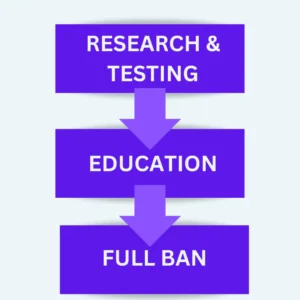Although the harms of asbestos and its connection to mesothelioma have been known since the 1960s, there is still not a full ban on it in the United States. However, federal health organizations are making efforts to appeal litigation to American workers. On March 18, 2024, the U.S. Environmental Protection Agency (EPA) “announced a final rule to prohibit ongoing uses of chrysotile asbestos, the only known form of asbestos currently used in or imported to the United States” (EPA.GOV, 2024). The chlor-alkali industry has been keeping this type of asbestos in use. About one-third of this industry of U.S. chlor-alkali plants use chrysotile asbestos to produce chlorine ((Phillips, 2024). Though this ban is a step in the right direction, the United States should follow the model set by other countries that have a full ban on asbestos.

Companies that still use asbestos are fighting this new legislature, saying that it is used to purify drinking water. However, studies have found safe and effective substitutes for chrysotile asbestos (Harrison, et al.). Alternatives such as p-aramid, PVA, and cellulose fibers have been found to be adequate replacements for this type of asbestos. Others oppose the new rule’s compliance timeline, stating that supply chain issues are causing shortages. The Biden administration has validated this concern and increased the compliance period from 10 years to 15.
What is Chrysotile Asbestos?
Also called “white” asbestos, chrysotile asbestos is a type of asbestos that is known for its heat-resistant properties. It is used in making automotive products, to make chlorine, purify drinking water, and pesticides. A critical review (Landrigan, et. al) that outlines the hazards of chrysotile asbestos says, “studies have established incontrovertibly that chrysotile causes cancer of the lung, malignant mesothelioma of the pleura and peritoneum, cancer of the larynx and certain gastrointestinal cancers.” The review emphasizes the danger of this type of asbestos: “comparative analyses have established that chrysotile is 2 to 4 times less potent than crocidolite asbestos in its ability to cause malignant mesothelioma, but of equal potency of causation of lung cancer.” Although chrysotile asbestos is incredibly dangerous and a proven carcinogen, it has a large presence in Europe and Asia. Many other countries, however, have taken steps to protect their citizens and workers by fully banning the mineral. Despite the safe alternatives to chrysotile asbestos, companies around the world continue to use it in their manufacturing processes.
What’s Next?
Although this legislation further protects citizens, the use of asbestos is still permitted in certain quantities in the United States. This means that workers are exposed to harmful asbestos fibers that could cause respiratory complications. President of the Asbestos Disease Awareness Organization Linda Reinstein says that testing conducted by her organization found products that contained different combinations of asbestos (Phillips, 2024). One such product was a children’s toy.
To protect people from the harms of asbestos, research and testing should be conducted to definitively identify what products the mineral is present in. Safe alternatives to asbestos should be more accessible, and the industries most affected by this ban should be educated on them. To prioritize public health, the United States legislature should continue in their efforts to fully ban the use and distribution of all asbestos types.
If you or a loved one has been diagnosed with mesothelioma, you deserve compensation and justice. Please contact The Halpern Law Firm at (800) 505-6000 to speak with a team who is dedicated to helping you file a claim to receive compensation for your diagnosis. We are committed to supporting Pennsylvania mesothelioma victims and their families through every step of the legal process.
Sources:
https://www.washingtonpost.com/climate-environment/2024/03/18/chrysotile-asbestos-ban-epa/
https://pubmed.ncbi.nlm.nih.gov/10441898/
https://pubmed.ncbi.nlm.nih.gov/10417355/